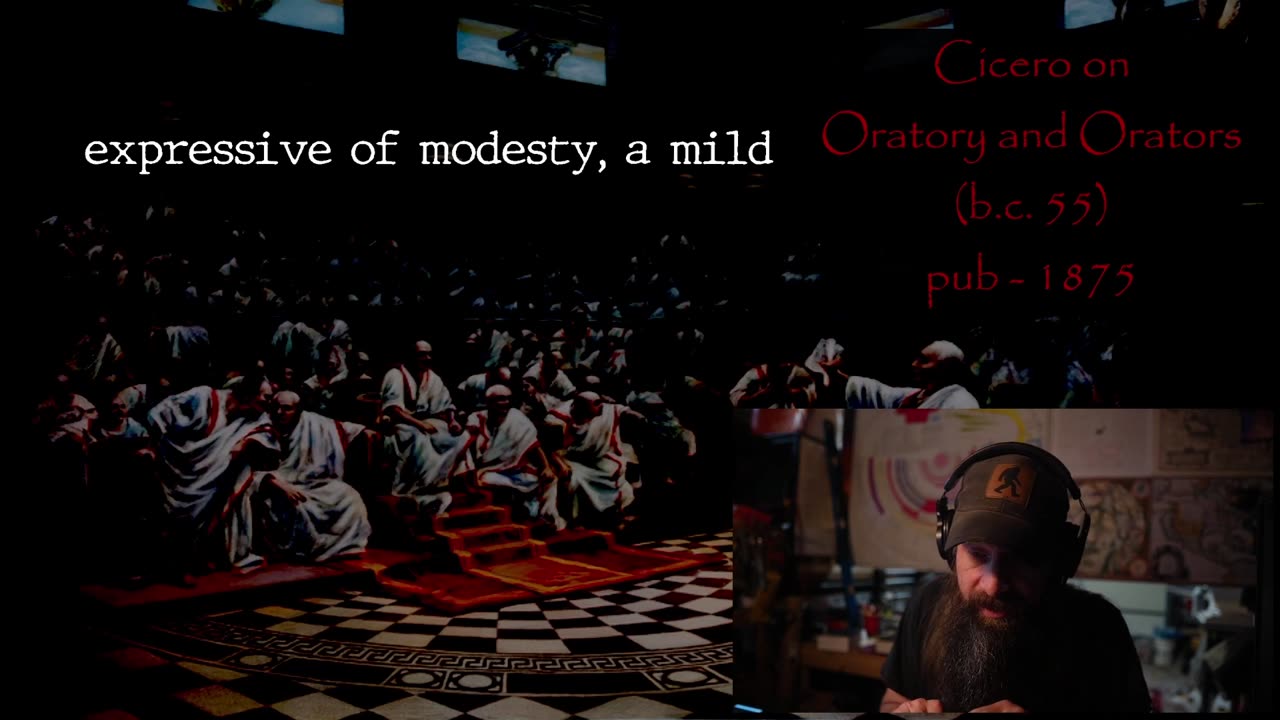Premium Only Content

Cicero on Oratory - B2 - XLIII XLIV
Cicero on Oratory - B2 - XLIII XLIV
Cicero discusses the importance of character and demeanor in effective oratory. He emphasizes that an orator's moral uprightness and positive conduct are crucial in persuading both judges and audiences. The manner in which one speaks—gentle, moderated, and appealing—can significantly affect the reception of the message being delivered. Cicero also contrasts this with more aggressive forms of oratory that aim to provoke strong emotions, suggesting that a speaker should understand the audience's predispositions to tailor their approach accordingly.
Key Points:
Morality in Speaking
Cicero highlights that the orator's morals and integrity play a significant role in their effectiveness. The character of the speaker and those they represent should merit respect, while the opposing side should evoke disapproval, influencing the audience's favor.
Demeanor and Tone
The speaker's demeanor, including a soft tone and modest expression, is vital for creating goodwill among listeners. Cicero advises that a certain gentleness in delivery can make the orator more appealing, particularly when addressing sensitive issues.
Appealing to Emotions
Understanding and appealing to the emotions of the audience is essential. An orator should strive to elicit favorable feelings from judges to facilitate persuasion, embracing the emotions the audience brings with them.
Adjustment of Strategy
Cicero notes that effective oratory requires adapting one’s strategy based on the audience's sentiments. If the judges are initially neutral or biased, the orator must work diligently to shift their emotions in favor of their argument.
Power of Eloquence
Eloquence is portrayed as a powerful tool that can sway even those who are resistant. Cicero describes eloquence as a commanding force that can influence opinions and behaviors, highlighting its value in the realm of public speaking.
-
 LIVE
LIVE
SpartakusLIVE
4 hours ago#1 Birthday Boy Celebrates with MASSIVE and HUGE 4.8-Hour Stream
435 watching -
 LIVE
LIVE
Man in America
5 hours agoFrom Oil Barons to Pill Pushers: The Rockefeller War on Health w/ Jeff Adam
621 watching -
 LIVE
LIVE
Barry Cunningham
3 hours agoBREAKING NEWS: PRESIDENT TRUMP THIS INSANITY MUST END NOW!
11,806 watching -
 LIVE
LIVE
StevieTLIVE
2 hours agoWednesday Warzone Solo HYPE #1 Mullet on Rumble
83 watching -
 5:58
5:58
Mrgunsngear
3 hours ago $0.38 earnedBreaking: The New Republican Party Chairman Is Anti 2nd Amendment
1.11K3 -
 LIVE
LIVE
Geeks + Gamers
2 hours agoGeeks+Gamers Play- MARIO KART WORLD
231 watching -
![(8/27/2025) | SG Sits Down Again w/ Sam Anthony of [Your]News: Progress Reports on Securing "We The People" Citizen Journalism](https://1a-1791.com/video/fww1/d1/s8/6/G/L/3/c/GL3cz.0kob.1.jpg) 29:34
29:34
QNewsPatriot
3 hours ago(8/27/2025) | SG Sits Down Again w/ Sam Anthony of [Your]News: Progress Reports on Securing "We The People" Citizen Journalism
3.08K1 -
 25:12
25:12
Jasmin Laine
7 hours agoDanielle Smith’s EPIC Mic Drop Fact Check Leaves Crowd FROZEN—Poilievre FINISHES the Job
3.68K16 -
 LIVE
LIVE
ZWOGs
11 hours ago🔴LIVE IN 1440p! - SoT w/ Pudge & SBL, Ranch Sim w/ Maam & MadHouse, Warzone & More - Come Hang Out!
47 watching -
 LIVE
LIVE
This is the Ray Gaming
58 minutes agoI'm Coming Home Coming Home Tell The World... | Rumble Premium Creator
34 watching